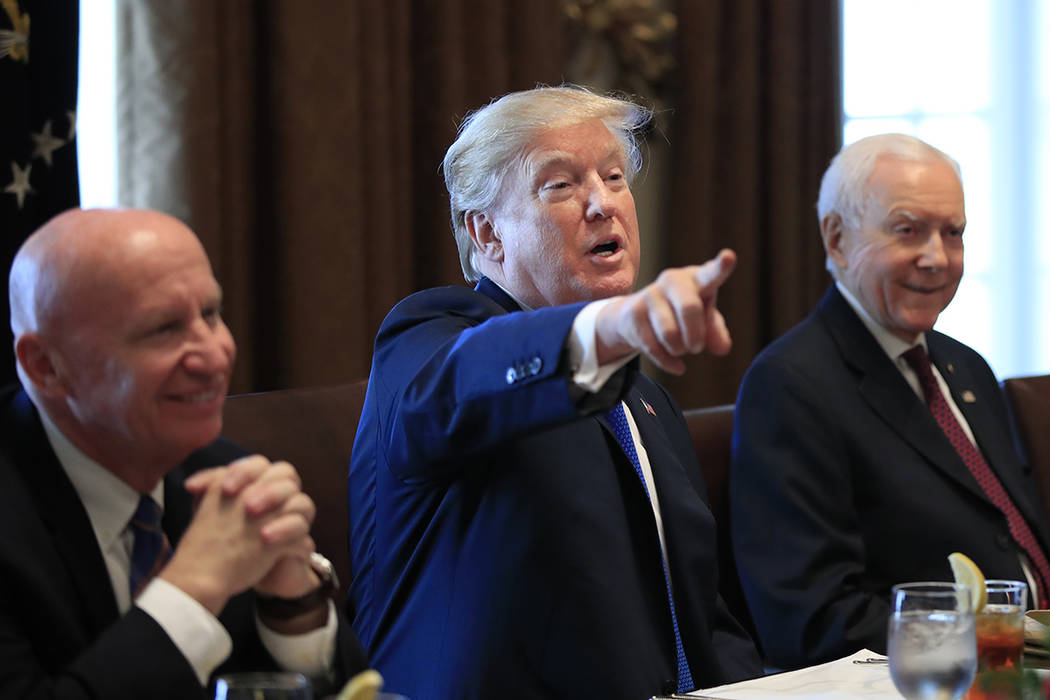Trump hails GOP tax overhaul as ‘giant tax cut for Christmas’
WASHINGTON — President Donald Trump assumed the role of Santa Claus Wednesday, telling a White House audience that “We want to give you, the American people, a giant tax cut for Christmas. When I say giant, I mean giant.”
On the afternoon that House and Senate leaders announced they had agreed on a major overhaul of the nation’s tax laws, Trump invited five working families to join him in the White House to tell Americans what the Republican tax plan would mean for their finances and to attest to his desire to keep his campaign promises.
It was a dramatic moment for this White House, but then, what day isn’t?
The plan forged by congressional Republicans would provide generous tax cuts for corporations and the wealthiest Americans. Middle- and low-income families would get smaller tax cuts.
The measure also would deliver the first major legislative accomplishment to the GOP president.
The night before, Trump experienced a brutal setback when Judge Roy Moore, the Republican whom he had endorsed in a special election in Alabama, lost to Democrat Doug Jones — the first Democrat to win an Alabama Senate seat in a quarter of a century.
When Jones is sworn in, probably not before January, the GOP majority in the Senate will shrink from 52 seats to 51 – and Trump will have to work that much harder to keep maverick Republican senators in line.
Extra heat on GOP
Since the Republican Senate failed to pass legislation to repeal and replace Obamacare, Trump has put extra heat on GOP leaders to pass a tax-cut bill before year’s end — lest they be branded as do-nothing Republicans.
Jones’ victory makes that goal more urgent.
If the Republican Congress fails to pass a measure, Trump will confront leaders with their failure to deliver on key campaign promises. If they pass a measure, Trump can claim not only that he kept a campaign promise, but also that he can work with Congress to affect change.
The legislation agreed to by House and Senate leaders, which is still being finalized, would cut the top tax rate for the wealthy from 39.6 percent to 37 percent, slash the corporate income tax rate from 35 percent to 21 percent and allow homeowners to deduct interest only on the first $750,000 of a new mortgage.
The top tax rate currently applies to income above $470,000 for married couples, though lawmakers are reworking the tax brackets.
The standard deduction would be nearly doubled, to $24,000 for married couples.
Details of the agreement were described by Republican senators and congressional aides.
Negotiators have removed several controversial provisions from the tax bill, including one that would have eliminated the deduction for interest on student loans and another deduction for medical expenses, said two congressional aides.
The tax bill also would scale back the deduction for state and local taxes, allowing families to deduct only up to a total of $10,000 in property and income taxes. The deduction is especially important to residents of high-tax states like New York, New Jersey and California.
“They’ve limited that deduction,” said John Buhl of the right-leaning Tax Foundation, but “it hasn’t gone away entirely.”
Votes planned for next week
Senate leaders plan to vote on the package Tuesday. If it passes, the House would vote next. GOP leaders hope to send the bill to Trump before Christmas.
“It’s not my vision of the perfect (bill), but again, this is definitely going to be a strong pro-growth tax package,” said Sen. Ron Johnson, R-Wis.
But Senate Minority Leader Chuck Schumer, D-N.Y., slammed the new measure for the reported provision to lower the top personal income tax rate to 37 percent. “That doesn’t go to a single person who makes below about $300,000 a year,” he said.
House Minority Leader Nancy Pelosi, D-Calif., also criticized GOP leaders for not releasing details of their deal. She said the GOP plan was dishonest for telling the middle class they’re getting tax breaks when in fact “they’re getting ripped off.”
Maya MacGuineas, president of the Committee for a Responsible Federal Budget, said she was concerned about the measure’s impact on the national debt.
“There was a lot of focus on the families and how they would gain from the tax bill, but predictably no mention of the thousands of dollars of debt each American family will inherit as we continue to pass it onto our kids,” she said.
“These higher debt levels will have a negative impact on economic growth,” MacGuineas warned.
Buhl of the Tax Foundation noted that the House and Senate measures qualified as tax reforms. “On the whole, the goal of tax reform is always to lower the tax rate and broaden the tax base” in a quest for fairness, even if the reforms were whittled back over time.
At the White House, Trump put the spotlight on intended beneficiaries of the tax bill. Bryant and Ashley Glick of Pennsylvania, he said, would see their tax rate fall from 15 percent to 12 percent, which would reduce their tax bill from $2,600 to $2,000.
Trump said the $14,000 annual tax bill for Adam and Lindsay Kovacs of Ohio would be cut by a third. They expected to put the money toward home renovations, and maybe to save for their children’s college education.
Leon and Maria Benjamin, pastors of the Life Harvest Church in Richmond, Virginia, also “will get a larger refund to help them pay their bills,” Trump said.
“To God be the glory,” Leon Benjamin said. “African-American families, urban communities, and families all across [the country] need this now,” he added.
“Everyday, hardworking Americans know that the future of this nation will never belong to those who say you can’t,” Trump said. “It will always belong to the American people who will say we will.”
Contact Debra J. Saunders at dsaunders@reviewjournal.com or 202-662-7391. Follow @DebraJSaunders on Twitter. The Associated Press contributed to this story.






















